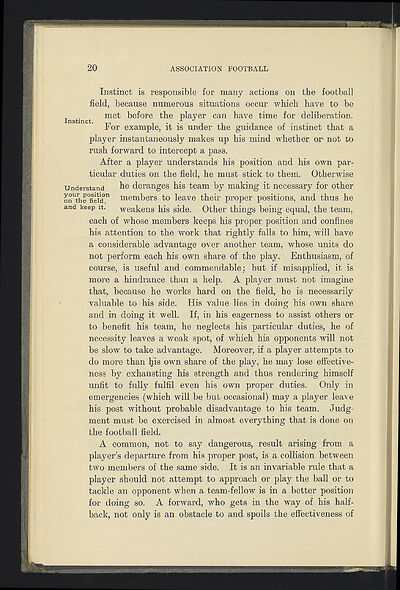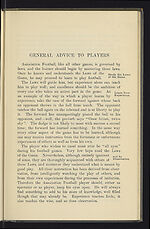Download files
Complete book:
Individual page:
Thumbnail gallery: Grid view | List view

20
ASSOCIATION FOOTBALL
Instinct is responsible for many actions on the football
field, because numerous situations occur which have to be
Instinct,
met before the player can have time for deliberation.
For example, it is under the guidance of instinct that a
player instantaneously makes up his mind whether or not
to
rush forward to intercept a pass.
After a player understands his position and his own par-
ticular duties on the field, he must stick to them. Otherwise
Understand
he deranges his team by making it necessary for other
your position p
proper
the field,
er ro members to leave their positions, and thus he
and keep it.
weakens his side. Other things being equal, the team,
each of whose members keeps his proper position and confines
his attention to the work that rightly falls to him, will have
a considerable advantage over another team, whose units do
not perform each his own share of the play. Enthusiasm, of
course, is useful and commendable; but if misapplied, it is
more a hindrance than a help. A player must not imagine
that, because he works hard on the field, he is necessarily
valuable to his side. His value lies in doing his own share
and in doing it well. If, in his eagerness to assist others or
to benefit his team, he neglects his particular duties, he of
necessity leaves a weak spot, of which his opponents will not
be slow to take advantage. Moreover, if a player attempts to
do more than his own share of the play, he may lose effective-
ness by exhausting his strength and thus rendering himself
unfit to fully fulfil even his own proper duties. Only in
emergencies (which will be but occasional) may a player leave
his post without probable disadvantage to his team. Judg-
ment must be exercised in almost everything that is done on
the football field.
A common, not to say dangerous, result arising from a
player's departure from his proper post, is
a
collision between
two members of the same side. It is an invariable rule that a
player should not attempt to approach or play the ball or to
tackle an opponent when a team-fellow is in a better position
for doing so. A forward, who gets in the way of his half-
back, not only is an obstacle to and spoils the effectiveness of
ASSOCIATION FOOTBALL
Instinct is responsible for many actions on the football
field, because numerous situations occur which have to be
Instinct,
met before the player can have time for deliberation.
For example, it is under the guidance of instinct that a
player instantaneously makes up his mind whether or not
to
rush forward to intercept a pass.
After a player understands his position and his own par-
ticular duties on the field, he must stick to them. Otherwise
Understand
he deranges his team by making it necessary for other
your position p
proper
the field,
er ro members to leave their positions, and thus he
and keep it.
weakens his side. Other things being equal, the team,
each of whose members keeps his proper position and confines
his attention to the work that rightly falls to him, will have
a considerable advantage over another team, whose units do
not perform each his own share of the play. Enthusiasm, of
course, is useful and commendable; but if misapplied, it is
more a hindrance than a help. A player must not imagine
that, because he works hard on the field, he is necessarily
valuable to his side. His value lies in doing his own share
and in doing it well. If, in his eagerness to assist others or
to benefit his team, he neglects his particular duties, he of
necessity leaves a weak spot, of which his opponents will not
be slow to take advantage. Moreover, if a player attempts to
do more than his own share of the play, he may lose effective-
ness by exhausting his strength and thus rendering himself
unfit to fully fulfil even his own proper duties. Only in
emergencies (which will be but occasional) may a player leave
his post without probable disadvantage to his team. Judg-
ment must be exercised in almost everything that is done on
the football field.
A common, not to say dangerous, result arising from a
player's departure from his proper post, is
a
collision between
two members of the same side. It is an invariable rule that a
player should not attempt to approach or play the ball or to
tackle an opponent when a team-fellow is in a better position
for doing so. A forward, who gets in the way of his half-
back, not only is an obstacle to and spoils the effectiveness of
Set display mode to:
![]() Universal Viewer |
Universal Viewer | ![]() Mirador |
Large image | Transcription
Mirador |
Large image | Transcription
Images and transcriptions on this page, including medium image downloads, may be used under the Creative Commons Attribution 4.0 International Licence unless otherwise stated. ![]()
| Sports publications > How to play association football, etc > (24) |
|---|
| Permanent URL | https://digital.nls.uk/231821091 |
|---|
| Description | More than 230 sports publications from the National Library of Scotland's collections. Featured sports include football, rugby, golf, shinty, athletics, bowls, cricket and hockey. Among the material from the late 19th and early 20th centuries are match programmes, club histories, and handbooks. From the late 20th century are promotional materials to encourage greater diversity in sport. Most items cover sports activities in Scotland. There are also publications relating to the Olympics and international matches. |
|---|---|
| Additional NLS resources: |
|

